
FrancoFiles S01E09: The Michelin Guide
Episode 009 – November 7, 2019
The Michelin Guide – How a French tire company became the world’s leader in food excellence.
IN SHORT – For the past 14 years, Michelin Guide has brought its team of incognito restaurant reviewers and experts to explore the delectable and wide-array of restaurant options in the United States. Enjoy an exclusive behind-the-scenes episode with Gwendal Poullennec, the International Director for The Michelin Guide, as he reveals the how the red guide has brought “France to the US” and how its influence has transformed consumers’ restaurant experiences and altogether the fine dining industry.
⯆ TRANSCRIPT
For our listeners, the French name “Michelin”, sometimes pronounced “Mitch-e-lin” in the U.S., can evoke two different ideas. ONE, the prestigious culinary merit for restaurants known as the “Michelin Stars” and TWO, the “Michelin Man” a smiling, tubby-like mascot made of white tires representing one of the oldest tire-manufacturing companies in the world.
The two may seem VERY distinct from one another, but IN FACT they are perfectly related.
We’ll talk with Gwendal Poullennec, the International Director for Michelin Guides about how the French tire-manufacturing company Michelin, founded in 1889 by André and Edouard Michelin in Clermont-Ferrand, led to the creation of the “Michelin Guide”, one of today’s leading reviewers in the world’s fine dining industry.
We will also explore with Gwendal about Michelin Guide’s origins in France and how French culture and its expectations in the kitchen and in cuisine have influenced Michelin’s current operations today.
But first, a little backstory to why we chose to talk about the Michelin Guide specifically for this series.
For the past 14 years, Michelin Guide has brought its team of incognito restaurant reviewers and experts to explore the delectable and wide array of restaurant options in 5 cities across the United States: Beginning with New York in 2005, following with Chicago, Los Angeles, San Francisco and finally, Washington DC.
Since the first DC edition in 2016, the Michelin Guide has hosted Washington DC’s Michelin Guide Star Reveal at the French Ambassador’s Residence on Kalorama Road. What is a Star Reveal you ask? A soirée where food journalists, distinguished chefs, public figures in the restaurant industry, and foodie-gourmands are specially invited to view the nomination of next year’s Michelin Guide Star Reveal. It’s just like the Grammys but with more delectable appetizers!
We promise you will learn of how the vision of two French brothers inspired quality and service to the restaurant business in the United States and around the world.
So here we are with Gwendal Poullennec, the International Director for the Michelin Guide, just moments before the big reveal at the Ambassador’s Residence.
Andrea - Gwendal, thank you for coming to speak with us on this very special evening. Before we jump into your role at Michelin Guide, could you speak to us about the history of Michelin and how the Michelin Guide came to be?
Gwendal - The idea of the Michelin Guide was born in France in 1900, and the star system as we know today (one, two, three) originated back in 1926. At the very beginning, the Michelin Guide was to help some motorists to find their way and to find the best services to repair their car for example. It was very practical and it intended to give people reasons to travel also. And step-by-step, the Michelin Guide at first was very practical, [started to become] more enjoyable. The restaurants and hotels were the main part of the Michelin Guide recommendations. Basically, we can say that the Michelin Guide is maybe one of the original brand content ideas, so it was very, very innovative at that time for providing people with a reason to travel.
Andrea - Why do you think that food was so important in the French culture but also for the motorists, for the vision of Michelin?
Gwendal - This a very good question first because the main point was to give the people a reason to travel and safe way to travel, because as you know Michelin is a tire company, and it was a way to expand the markets. But the traveling involved was also a good opportunity to discover the “terroir,” citizen territory, the products, and yes obviously food is a great part of the French culture and not only food, also the wine, all that coming together.
Andrea - Absolutely, tell me a little bit more about the Michelin Guide’s rating system, the Stars, the Bib Gourmand and finally the network of these “undercover inspectors,” we can call them.
Gwendal - First, starting with a methodology, all over the world we apply the same methodology looking at the quality of the food based on 5 criteria. First of all, the quality of ingredients, then the mastery of cooking techniques, then the balance, harmony of flavors, the personality of the chef as expressed on the plate, and the consistency throughout the menu and throughout the year. And then for example, for Bib Gourmand we also take into account very formally to be able to recommend the best restaurants for value for money. So good food at very affordable price.
Andrea - Yes, absolutely that sounds like the right criteria and a rigorous process. The inspectors are there to inspect along the way throughout a certain amount of time, they are your “seers” in some ways in the Michelin industry.
Gwendal - I am the only public face of the so-called famously anonymous inspectors. The inspectors are anonymous because it’s a way to ensure that there are living the restaurant experience the same way as any normal customer. Today all around the world we have 15 different nationalities of inspectors speaking altogether more than 25 different languages, we have more and more female inspectors. Okay, what can I tell you is that let’s say the operators, they are about 41 years old.
Andrea - Interesting facts! And so, I wanted to go back to the origin of our podcast, we are the FrancoFiles podcast. Most of us know that the French love food but all joking aside how do you think the French standards in cuisine culture play a role in the Michelin rating system?
Gwendal - Oh! Let’s say that of course, France was the original playground for the Michelin Guide, but then from the very beginning the methodology was crafted to fit with all the culinary culture because starting in 1904 the Michelin Guide started to expand internationally. Today however, we can say that the French culture still has a lot of impact on the culinary world and on the Michelin Guide. If we look at all the selections of the Michelin Guide today so in more than 30 different countries, we got about 20% of restaurants rated with a star offering French food or using French products or French techniques. And then you also have a lot of restaurants today that have been influenced by the French mastery of cooking techniques, and I will say in some fields for example like pastries, France is still taking the lead.
Andrea - Yes, I think my croissant in the morning will agree. Speaking of expansion, tell me a bit more about why did Michelin might expand to the US and choose these U.S. cities. Then finally what about the gastronomy scene here in Washington D.C.?
Gwendal - You know the Michelin Guide started in the U.S. in 2005, landing in New York from Europe, but the U.S. culinary scene has been improving a lot, developing a lot, since we first started in New York. We have seen New York or San Francisco or Chicago [receive] more and more stars from one year to another, you know almost blossoming, so the culinary scene is becoming more and more consistent and also more and more diverse. Here in D.C. it is quite stunning to see how many styles of food [there are], just in the D.C. Guide we have 36 different cuisines style so that tells a lot about what is happening here.
Andrea - Well, I am looking forward to celebrating the Michelin star chefs tonight at the Residency and it’s been an absolute pleasure to speak with you. Thank you very much and I wish you luck for the rest of the year.
Gwendal - Thank you! Bon appétit!
If you liked this episode of FrancoFiles, please be sure to subscribe, rate us and review us on ApplePodcasts and Spotify.



















